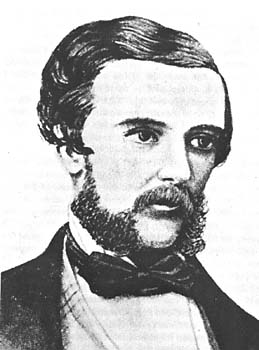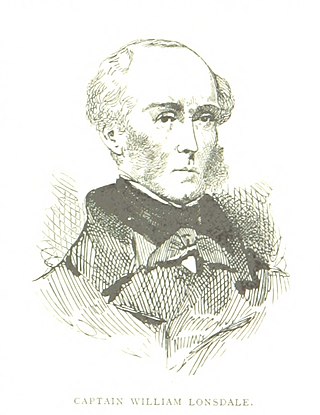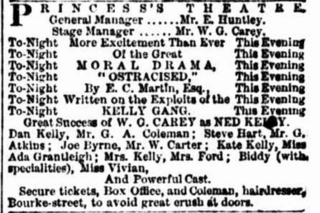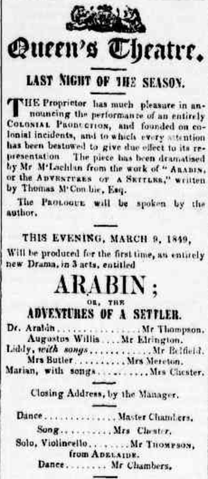
Bushrangers were originally escaped convicts in the early years of the British settlement of Australia who used the bush as a refuge to hide from the authorities. By the 1820s, the term had evolved to refer to those who took up "robbery under arms" as a way of life, using the bush as their base.
This article describes the history of the Australian state of Victoria.

William Buckley, also known as the "wild white man", was an English bricklayer, and served in the military until 1802, when he was convicted of theft. He was then transported to Australia, where he helped construct buildings for the fledgling penal settlement at Port Phillip Bay in what is now Victoria, Australia.

John Batman was an Australian grazier, entrepreneur and explorer. He is best known for his role in the founding of Melbourne.

Gundagai is a town in New South Wales, Australia. Although a small town, Gundagai is a popular topic for writers and has become a representative icon of a typical Australian country town. Located along the Murrumbidgee River and Muniong, Honeysuckle, Kimo, Mooney Mooney, Murrumbidgee and Tumut mountain ranges, Gundagai is 390 kilometres (240 mi) south-west of Sydney. Until 2016, Gundagai was the administrative centre of Gundagai Shire local government area. In the 2021 census, the population of Gundagai was 2,057.

The Old Melbourne Gaol is a former jail and current museum on Russell Street, in Melbourne, Victoria, Australia. It consists of a bluestone building and courtyard, and is located next to the old City Police Watch House and City Courts buildings, and opposite the Russell Street Police Headquarters. It was first constructed starting in 1839, and during its operation as a prison between 1845 and 1924, it held and executed some of Australia's most notorious criminals, including bushranger Ned Kelly and serial killer Frederick Bailey Deeming. In total, 133 people were executed by hanging. Though it was used briefly during World War II, it formally ceased operating as a prison in 1924; with parts of the jail being incorporated into the RMIT University, and the rest becoming a museum.

Edmund Besley Court Kennedy J. P. was an explorer in Australia in the mid nineteenth century. He was the Assistant-Surveyor of New South Wales, working with Sir Thomas Mitchell. Kennedy explored the interior of Queensland and northern New South Wales, including the Thomson River, the Barcoo River, Cooper Creek, and Cape York Peninsula. He died in December 1848 after being speared by Aboriginal Australians in far north Queensland near Cape York.

William Westwood, also known as Jackey Jackey, was an English-born convict who became a bushranger in Australia.

William Lonsdale supervised the founding of the official settlement at Port Phillip from 1836 and went on to serve under the Superintendent La Trobe from 1839 to 1854.
There were two Australian periodicals called The Port Phillip Gazette.

Broadford is a town in central Victoria, Australia. At the 2021 census, Broadford had a population of 4,076. The town is the headquarters of the Shire of Mitchell local government area and is approximately 73 kilometres (50 mi) north of the state capital, Melbourne.
The Herald was a morning – and later – evening broadsheet newspaper published in Melbourne, Australia, from 3 January 1840 to 5 October 1990. It later merged with its sister morning newspaper The Sun News-Pictorial to form the Herald-Sun.
Henry Edmund Pulteney Dana (1820–1852) established the Native Police Corps in the Port Phillip District in 1842, he was responsible for two massacres of Aboriginal people one at Barmah Lake in 1843 and the other at Snowy River in 1846. Dana was born in England, his father being Captain William Pulteney Dana of the 6th Regiment. Henry Dana migrated to Van Diemen's Land in 1840, but in 1842 he relocated to the Port Phillip District where he renewed acquaintance with Superintendent Charles La Trobe, whom he knew in London. The two men became firm friends and Latrobe appointed Dana to establish a native police corps.

Thomas McCombie was a journalist, historian, novelist, merchant and politician in colonial Victoria, a member of the Victorian Legislative Council, and later, the Victorian Legislative Assembly.
Lauchlan Mackinnon was a pastoralist, politician and newspaper proprietor in colonial Australia. Mackinnon one of the most enterprising of the pioneer colonists of Victoria (Australia) and one of the proprietors of the Melbourne Argus from 1852 until his death.
The Border Police of New South Wales was a frontier policing body introduced by the colonial government of New South Wales with the passing of the Crown Lands Unauthorised Occupation Act 1839.

Ostracised, or Every Man's Hand Against Them is a 1881 Australian play about Ned Kelly by E.C. Martin. It was the first straight dramatisation of the Kelly story from an Australian writer although there had been one in London. The play was banned in Sydney.

Arabin; or, The Adventures of a Settler is an 1849 Australian stage play by James McLachlin. It was arguably the first Australian play presented in Melbourne.
The Rebel Chief is a 1849 Australian stage play by Francis Belfield. It was produced at a time when Australian plays were extremely rare.












